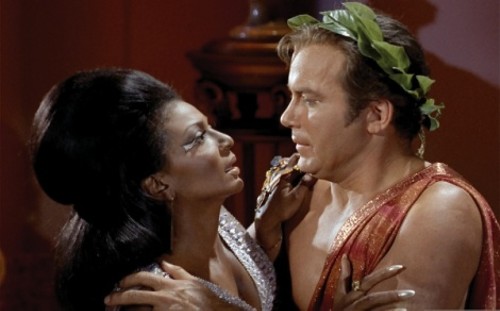Being a geek means you read or watch a lot of stories. For the most part, they can all be classified as science-fiction or fantasy. There are sub-genres, sure—superhero, horror, etc.—but at the end of the day, I think you can boil it down to just the two.
For now, we’ll concern ourselves mainly with the importance of science-fiction, at least in my own humble opinion. My hope is to get you to think about it in a different way.
Science-fiction has long been a fertile ground for the imagination—not just for what life would be like in the future, though. At its best, the science-fiction genre holds up a distorted mirror of our present, allowing us to learn hard lessons about society and the world in a much more palatable way.
Though it didn’t start with Gene Roddenberry and Star Trek, that seems to be one of the easiest examples people can wrap their heads around. In 1966, when Star Trek began, equal rights for minorities (women included) were still just a dream; Martin Luther King Jr. had only delivered his “I Have a Dream” speech three years prior. Putting Nichelle Nichols on the bridge as Lieutenant Uhura so matter-of-factly was a minor revolution. Having her kiss Kirk? Unheard of.
But it’s not just racism that has found analogues in the world of science-fiction; discrimination of all sorts finds its way into the genre. The feeling of being a mutant in X-Men—and being despised by regular people the world over—could apply to just about any marginalized minority. The phrase “mutant rights” could very easily be replaced by “gay rights,” “women’s rights” and so on. Because it’s science-fiction, it’s somehow easier for people to relate to the protagonists and say, “Well, of course they deserve equal rights.” It’s not hard to convince a kid who’s a fan of the X-Men that disliking someone because they’re different is not OK.
Good, socially conscious science-fiction doesn’t always show us the way things should be. It often shows us the frightening realities we could be facing. George Orwell’s 1984 is often considered the prototype. A government that controls information can control how and what you think, but when you think for yourself, you become a threat. Brilliant variations on that theme have been created. Kurt Vonnegut’s Player Piano explores a world where machines take over production, and speaking against the company is a threat. George Lucas’ THX-1138 explores a future where religion and consumerism have taken hold, and doing something as simple as not taking the medication assigned to make you more docile is a punishable offense. We see hints of these speculative futures coming true in today’s world, and it forces us to be more critical of the decisions made in our name.
As a child, these lessons seeped into my brain—and, I think, turned me into a much more moral person, devoted to doing no harm to the world around me.
Science-fiction has a shallow end to the pool, though. As much as I love Star Wars, it’s not quite as deep as the stories that came before it—more adventure than allegory—and sci-fi hasn’t exactly been the same since. That’s not to say that Star Wars doesn’t include any deeper resonances; the good-versus-evil story in the saga is second to none. But by reading deeper into the subtext of our favorite stories, we’re actually making the world (and ourselves) better. That’s what science-fiction does: It helps us build a better tomorrow today.
Bryan Young is the editor-in-chief of BigShinyRobot.com and author of Man Against the Future, a collection of 17 science-fiction stories.
Speaking of...
-
Stepping Back Into The '80s Twilight Zone
Memory Lane has a few twists and turns for this '80s sci-fi relic.
- Feb 15, 2017
-
Deep Space Nine Finally Released, With Some Issues
A look into the newly released DVD collection.
- Feb 13, 2017
-
The Pipeline: The Star Trek Episode Collector's Dream
Celebrating 50 years with everything coming to Blu-ray and DVD.
- Jan 30, 2017
- More »
More by Bryan Young
-
Utah's newest book ban law is designed to let small school districts punish Salt Lake City kids.
Small Lake City
- Apr 3, 2024
-
The case for not messing with AI "art"
A creator implores us not to treat something created from others' work as worth anyone's time.
- Mar 27, 2024
-
The Utah Legislature's bathroom bill makes criminals out of trans children
Small Lake City
- Jan 31, 2024
- More »




